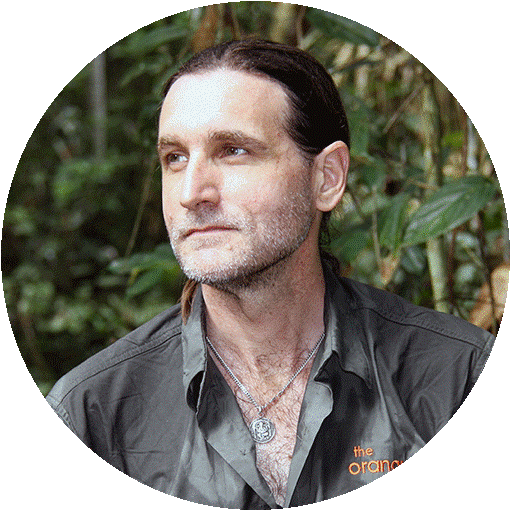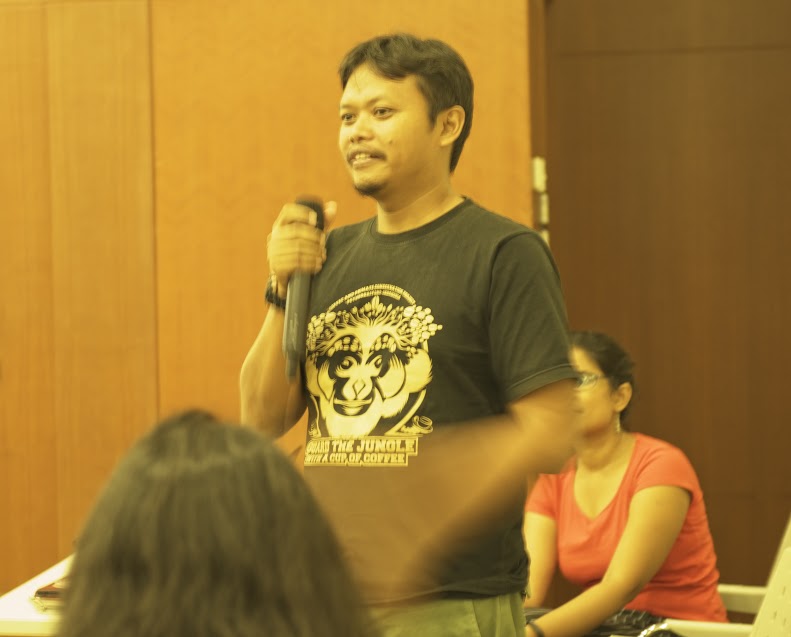
Written by Sia Sin Wei
After sending off the year of the Monkey and welcoming the year of the Dog, we were delighted to host Leif Cocks, Arif Setiawan, Helene Birot and Ella Brown on the 24th February at the Singapore Botanic Gardens. Having representatives of both the Prosimians and the Great Apes, we got a glimpse of some innovative projects from across the primate family tree.
Indonesia has 40 species of primates and among these is the Sumatran orangutan (Pongo ablii). Sumatran orangutans are a major part of the conservation work of Dr. Leif Cocks, who inspired us with his 30 years of experience working with orangutans, starting with his early experiences while still a zookeeper. Being up close and personal with orangutans has led him to believe that apes deserve to be treated as people. One day, we will look back and wonder how we did not respect the sentience and personhood of our closest cousins.

Leif showed different aspects of his conservation work in Indonesia and shared some of the lessons he has learned, including his personal philosophy: to reform the world means having to reform ourselves first. He pointed out that happiness is not found inside ourselves but outside when we exercise care and compassion for our fellow beings – a worldview that would do us good to adopt more often!
Arif Setiawan then talked about his conservation projects in central Java and the Mentawai islands. During fieldwork on Javan silvery gibbons (Hylobates moloch) in Central Java, he saw the local economic importance of shade-grown coffee. This led him to start a conservation project that would both protect primate habitats and provide a sustainable livelihood for the locals. Arif and his team raised the value of the coffee by increasing its quality.

On the Mentawai Islands, primates are also hunted for food. Alternate forest products must still be found such that the locals can earn a fair income. Jobs in conservation can also be given to locals so that they can be part of the solution instead of being part of the problem. Arif talked about how he has transformed a hunter into a “para-researcher”. Instead of shooting primates with rifles, he now shoots with cameras and records their calls as part of his research work.
Our local zoo is just one of many retailers of the Mentawai coffee, so you contribute to conservation by buying a packet there! While challenges lie ahead for Arif and his team, their success with this approach shows that conservation and the economy is not a zero-sum game.
Helene Birot and Ella Brown presented the Little Fireface project, located in West Java. The project focuses on the charismatic and understudied Javan Slow Loris (Nycticebus javanicus), a basal primate that is critically endangered due to habitat loss and the wildlife trade. The project takes its name from a local name for the loris, which refers to their shiny eyes when exposed to light. Being in a highly degraded agroforest allows the project team to investigate the basic biology of slow lorises and human-primate coexistence.
Research on slow lorises was done through observation and radio-trapping. The project has uncovered their basic biology to help inform conservation strategies for them. Dealing with the wildlife trade is an important aspect of the Fireface project. Many people are interested in slow lorises as pets as videos showing slow lorises in domestic settings have attracted more views than videos of them in the wild. When more people are interested in having their own, a cruel trade is fueled. By collecting and analysing such data, the Little Fireface Project can better understand trends to formulate outreach efforts.
The Little Fireface Project considers outreach to be important. By engaging with students, they ensure future generations will grow up to be passionate stewards of their local biodiversity. Besides having nature clubs at local schools, a book and activity pack was published by the Fireface Project to increase awareness of slow lorises among students. After engaging with the materials, the students showed a significant improvement of ecological literacy. Adults are not forgotten – there are public events for them too!

The three conservation projects featured in this talk may have different goals, strategies and challenges, but they paint a story on the changing face of conservation – a researcher that merely cares about primates is a lousy conservationist. Involving and empowering the local community is crucial to the ongoing success of our speakers and their teams. By being good members of the community and earning trust, researchers can not only be ambassadors for conservation, but connect the community they befriend and the outside world. This is the direction that primate conservation should go – primates matter, but humans matter too!



